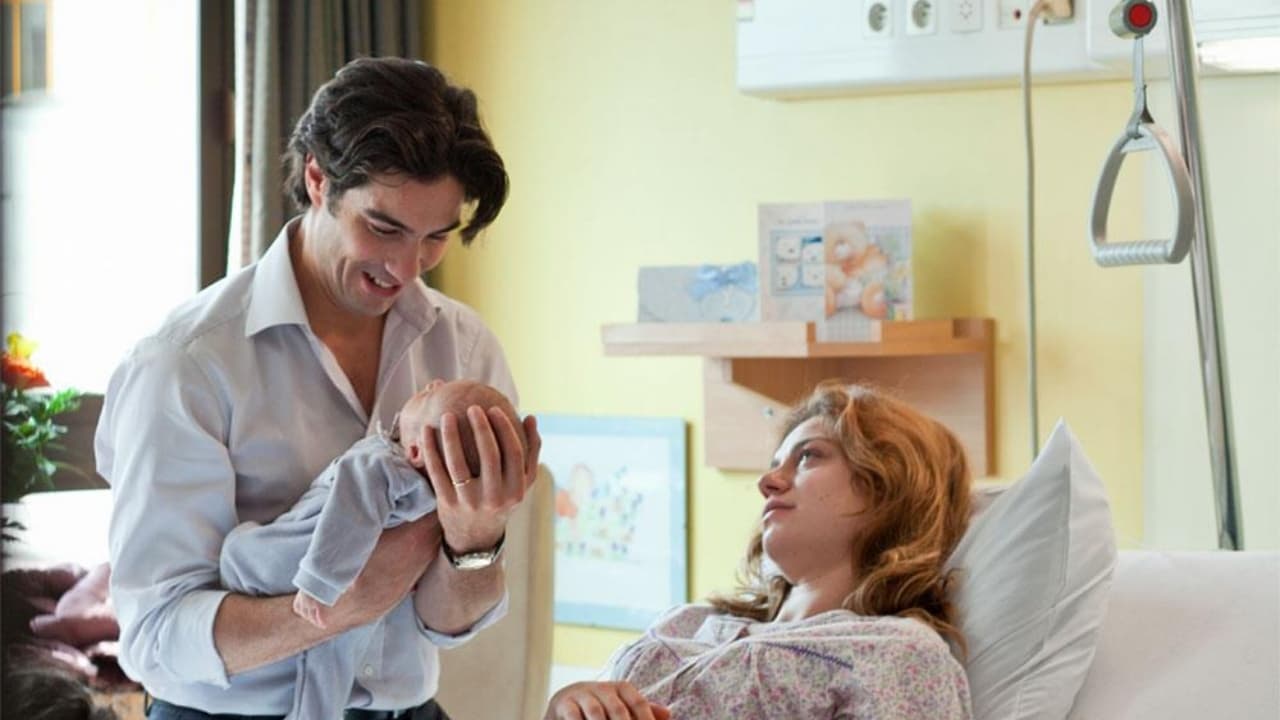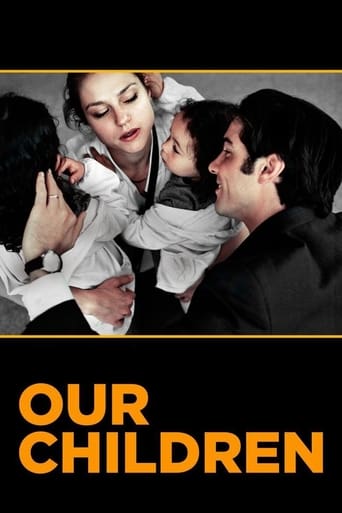



What makes it different from others?
Some things I liked some I did not.
A brilliant film that helped define a genre
It really made me laugh, but for some moments I was tearing up because I could relate so much.
View MoreThe film is directly inspired by the case of Geneviève Lhermitte, a Belgian woman who, in 2008, brutally murdered her five children.What in the world drove this hitherto model mother to such a barbarous act... is the anguished question asked by writer-director Joachim Lafosse (also Belgian) in this intense if somewhat restrained drama. A question all the harder to answer when the deplorable "heroine" of this family tragedy was at a loss, as she put it, "to understand what has happened, for I still haven't understood. I acted the opposite way to what I thought."Lafosse cannot provide THE answer, it goes without saying. How could he since the real-life murderess in person proved unable to understand herself? But he tries hard to come as close to the truth as possible. In any case, he refuses to condemn her. Instead, he describes thoroughly all the stages of the way of the cross she undergoes before committing her irreversible act.Co-written with Matthieu Raynaert and Jacques Audiard's favorite screenwriter Thomas Bidegain, "A perdre la raison" indeed follows the various developments of the affair very realistically even if the names and a few details have been changed (after all this is a fiction work, not a documentary) : Geneviève has become Murielle and her husband is named Mounir instead of Bouchaib. Plus, the couple in the fiction has four children whereas they had five in the real situation. As for their evil genius, he is not Dr. Michel Schaar any longer, but Dr. André Pinget. Basically however, all the seeds of the tragedy sown in real life are present in the fiction and in it too the wild wind cannot but be reaped: once established the toxic relationships between Murielle (who craves the intimacy of a love nest), Mounir (whose gratefulness to his foster father lets him invade it) and André (who gives the couple everything but controls their lives from A to Z), the infernal machine is activated and – a constant in classic tragedy – nothing can stop it. Such an approach will naturally be effective only if it rests on strong acting performances, which is fortunately the case here. Emilie Dequenne ("Rosetta", "La fille du RER") is deeply moving as Murielle, this Mother Courage - Mater Dolorosa turned Medea, while Tahar Rahim ("Un prophète", "Grand Central") translates to perfection Mounir's affectionate but weak temperament. As for Niels Arestrup ("Un prophète", "Diplomatie"), the formidable actor proves more menacing and terrifying than ever in the role of the couple's Nemesis hiding beneath a friendly exterior.Quite a gripping work, "A perdre la raison" is a film experience you will find hard to forget. Both a cold analysis of a tragic news event and the sympathetic portrait of a desperate woman, it is one of the most impressive movies shown in 2012.
View MoreA Perdre La Raison starts badly because within the first moments, Joachim Lafosse chose to reveal the final outcome: 4 little coffins, what's more white, one quickly can connect the dots which completely annihilates the element of surprise and ruins part of the interest of the movie, which anyway remains minimal.Indeed, we're dealing with a superficial script, that raises a lot of questions but only offers a few answers which is very frustrating. One has trouble grasping the stakes and understanding the motivations because under the guise of suggesting, the movie never gets deeper on anything. The plot is very, very limited the dramatic resources are almost nonexistent and the lack of dialogues is as heavy as the atmosphere prevailing within this distinctive family, to say the least.The character of André, quite intriguing and very well embodied by the ageless Niels Arestrup, is the only thing to remember.
View MoreTwo arcs propel Joachim Lafosse's remarkable Our Children. The most obvious and significant is the heroine Murielle's decline from a beautiful, loving, young spirit to a depressed, oppressed, despairing drudge. She proves the dictum, Biology is destiny. From her honeymoon through her four child bearings she loses her sense of self, her liberty, her control over her life. Her last action is her tragic resolve to save her three daughters and one son from their being ruined by the sexist, patriarchal system that destroyed her. Unable to grant them liberty she gives them death. Though her Moroccan husband Mounir claims he doesn't want to raise his daughters in his sexist homeland, Murielle is destroyed by a European patriarch in Belgium. Dr. Pinget provides the antithetic arc. His apparent generosity and care are gradually exposed as heartless self-serving power and authority. Having married a young Moroccan woman, he leaves her in her homeland but brings one of her brothers, then eventually the other, to Europe variously to serve him. When his hopes to have Mounir join his medical practice are dashed, he hires him for office work. He pays for Mounir and Murielle's honeymoon, then agrees to join them. He shares his house with them, then to keep them buys them an estate where he again lives with them. His callousness towards Murielle drives her tragedy. The tension between the Moroccan family and the fat, hedonistic, impotent but suffocatingly powerful white European doctor adds another compelling theme. This domestic tragedy is also a parable for European colonialism. The white power insinuates itself into its colony, funds it, wins its trust and affection, imposes its own culture, but for all its pretense of generosity and care insists on dominating it and imposing its will. Any move to independence is suppressed as an affront to nature and to reason. (The film's original French title is A Prendre la raison, or Insanity.) That ruthless power is what the male patriarchy shares with the European colonial tradition.The film opens with a woman crying, begging that her four children be buried in Morocco. So it's a whodunit. Except here the killer is the true victim. For more see www.yacowar.blogspot.com.
View MoreBelgian screenwriter and director Joachim Lafosse's fifth feature film which he co-wrote with French screenwriter Thomas Bidegain and Belgian screenwriter Matthieu Reynaert, is based on a real-life incident that took place in Brussels in 2007 where a 42-year-old woman killed her five children. It premiered in the Un Certain Regard section at the 65th Cannes International Film Festival in 2012, was shot on location in Morocco and Belgium and is a France-Belgium-Luxembourg-Switzerland co-production which was produced by producers Jacques-Henri Bronckart and Olivier Bronckart. It tells the story about Mounir and Murielle, a couple in their late twenties who lives in Brussels, Belgium. Murielle is a Belgian elementary school teacher and Mounir, a Moroccan and former youth worker without a permanent residence certificate. After deciding to get married, Mounir shares the great news with his close friend André Pinget, a wealthy doctor who has been like a father to him through most of his childhood and helped him and his family in many ways. André gives Mounir a full-time job at his practice, let's him and Murielle live with him in his apartment and Murielle and Mounir is happily married, but as time goes by André's ways of making himself indispensable and his insisting involvement in their lives begins to stagnate their relationship.Precisely and commandingly directed by Belgian filmmaker Joachim Lafosse, this somewhat biographical and fictional story which is narrated mostly from the female protagonist's viewpoint, draws an intimate and nuanced portrayal of a Belgian teacher's saint like suffering after marrying, becoming a mother and being second-rated by a husband who is more committed to honoring the wishes of his generous and demanding father figure. While notable for it's naturalistic milieu depictions, fine production design by production designer Anna Falguères, cinematography by Belgian cinematographer Jean-François Hensgens and realism, this narrative-driven and dialog-driven psychological drama triangle depicts an in a sense provocatively heartrending, due to it's non-judgmental and empathic portrait of the main character, study of character and contains an efficient classical score which emphasizes the film's tragic undertones.This finely paced character piece about emigration, conflicting human relations, motherhood, mental exhaustion and paper marriage which is set in Brussels, Belgium during a summer in the early 21st century and which has been chosen as Belgium's submission to the Academy Award for Best Foreign Language Film at the 85th Academy Awards in 2013, is impelled and reinforced by it's cogent narrative structure, abrupt editing by film editor Sophie Vercruysse, substantial character development, the poignant and impressive acting performances by Belgian actress Émilie Dequenne who comes close to her unforgettable acting performance in the Dardenne brothers' "Rosetta" (1999) and the fine acting performances by French actors Niels Arestrup, Tahar Rahim and Belgian actress Stéphane Bissot. A concentrated and ambivalent love-story which gained, among other awards, the Un Certain Regard Award for Best Actress Émilie Dequenne at the 65th Cannes Film Festival in 2012.
View More